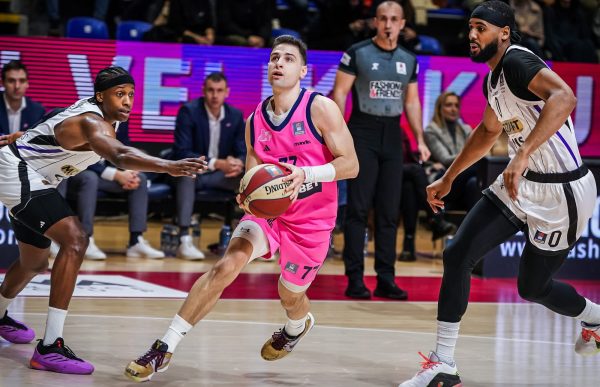IOC picks Chicago among 4 finalists for 2016 Summer Olympics
June 4, 2008
ATHENS, Greece – Getting to the final phase was one thing. Now, Chicago has some hard work ahead to overcome weaknesses in its bid for the 2016 Summer Olympics.
Chicago was one of four cities selected as bid finalists Thursday, along with Tokyo; Madrid, Spain, and Rio de Janeiro, Brazil. The lineup sets up a high-profile contest featuring major cities from the Americas, Europe and Asia.
Failing to make the International Olympic Committee shortlist were three cities – Doha, Qatar; Prague, Czech Republic, and Baku, Azerbaijan.
The IOC said Doha had the potential to host the Olympics and even rated the Qatari capital tied for third with Chicago in its technical assessment. But the IOC said it turned back Doha because it proposed holding the games in October.
The finalists now advance to a 16-month race ththe full IOC at its session in Copenhagen, Denmark.
Get The Daily Illini in your inbox!
“It’s a very competitive at will culminate on Oct. 2, 2009, with a secret ballot by field,” said Chicago Mayor Richard Daley, who is trying to take the Summer Olympics back to the United States for the first time since the 1996 Atlanta Games. “The competition begins now.”
Chicago got a strong dose of reality in the IOC’s report assessing the technical bids, which cited problems with finances and transportation, among other things.
“We really respect the experts who have done the evaluation,” said Chicago bid leader Patrick Ryan, who had not yet read the report. “We’re going to learn from that. We’re going to respect it and we’re not going to alibi to ourselves about it. We’re going to do everything we can to correct all the deficiencies.”
Tokyo scored highest in the technical evaluation, which rated cities in 11 categories – including infrastructure, venues, transportation, security and finances – on a scale of 1 to 10.
The Japanese capital scored an overall average of 8.4, followed by Madrid with 8.2. Chicago was back at 7.0 with Doha, with Rio at 6.5. Chicago didn’t rank first in any of the categories, and lagged in fifth in three.
The early ranking is not crucial, however. When the IOC picked the finalists for the 2012 Olympics in 2004, London was ranked third behind first-place Paris and Madrid in the technical report. London went on to win the games in 2005.
“We’ll evaluate the report, look at the strong points and any weaknesses,” Daley said. “There’s always a wakeup call for everything. If there is any negative, you take it and try to be able to correct it, simple as that.”
The IOC report said Chicago’s wording on government guarantees “does not fully confirm” with requirements; questioned the $27 billion figure listed for highway and transit projects; said sports venue construction budgets “appear low and may warrant review,” and cited a “lack of detail” in plans for transportation between venue clusters.
“We’re very pleased, but at the same time sober knowing we have to improve and have a tremendous amount of work ahead,” U.S. IOC member Bob Ctvrtlik said. “This is the first hurdle. … We’ll keep improving until we submit our bid book.”
Cities must submit their detailed bid files to the IOC by Feb. 12, 2009. After that, a panel of IOC experts will visit each of the cities, tour the proposed sites and meet with bid and government leaders. The panel will release an evaluation report to the IOC members a month before the October 2009 vote.
Madrid is back again after a third-place finish in the vote for the 2012 Olympics.
“I think there are about 40 million Spaniards that want us to bring the games home,” bid leader Mercedes Coghen said.
Tokyo, which held the Summer Games in 1964, hopes to bring the Olympics to Asia eight years after Beijing.
“Now it’s full steam ahead for my team and the Japanese people,” Tokyo bid chief Ichiro Kono said. “We have no time to lose in preparing the best possible candidature file for the IOC.”
Rio would become the first South American city to host the Olympics.
“We’re very happy – the emotion to have a city of a country that never organized the Olympic Games among the others that have already organized. It’s a great challenge but I think we are ready,” Rio bid president Carlos Arthur Nuzman said.
Whether to include Doha in the final mix shaped up as the main issue for the IOC executive board. In the end, the IOC said it couldn’t accept Doha’s proposal to hold the games from Oct. 14-30 to avoid the searing summer heat. The IOC prefers the July-August time slot.
The board “unanimously decided not to grant this exception as it conflicts with the international sporting calendar and would therefore be bad for the athletes and for sports fans,” IOC spokeswoman Giselle Davies said. “It would disrupt athletes’ training programs and overload the sports schedule at an already busy time of the year.”
Doha, capital of a tiny but wealthy Arab Gulf country of about 1 million people, had loomed as the wild card as it sought to bring the games to the Middle East for the first time.
“While we are of course disappointed, we remain extremely proud to have been given the opportunity over the past 12 months to demonstrate that Doha is a truly modern and developing city, able to compete with some of the world’s largest capitals and able to host international sporting events of the highest standard,” Doha bid chairman Hassan Ali Bin Ali said.
Associated Press Writer Deanna Bellandi contributed to this report.





